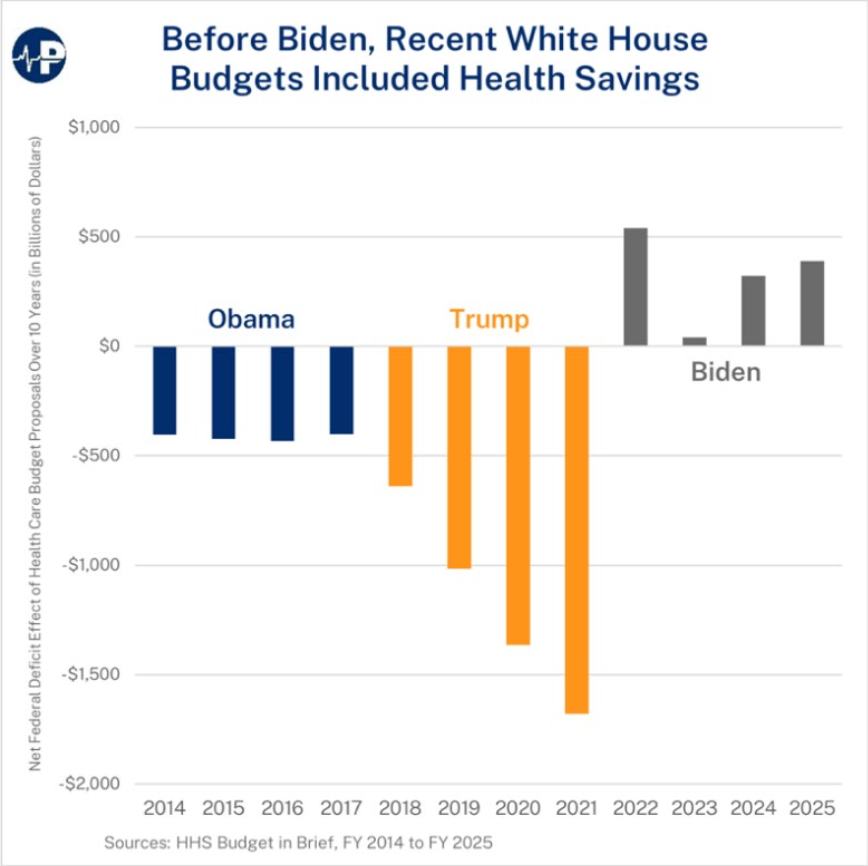Biden's Health Proposals Would Expand Washington's Control and Spending
On Monday, President Joe Biden released his Fiscal Year 2025 Budget Request, which calls for a significant expansion of federal health care spending. He ignores the fact that mandatory federal health care programs are the primary drivers of the nation’s out-of-control $34 trillion debt.
The Congressional Budget Office (CBO) baseline shows spending on major health care programs will exceed $3.2 trillion in 2034, three times larger than the amount projected to be spent on national defense in the same year.
The Biden budget exacerbates existing problems within our country’s health care system by proposing a one-size-fits-all, “Washington knows best” approach that will drive prices up and the quality of care down.

Brian Blase, President of Paragon Health Institute, and a former health policy advisor to President Donald Trump, highlighted how Biden’s health care proposals would detrimentally expand federal spending and Washington’s control over the health care system.
Word on the Street via Paragon Health Institute:
- “The federal government already spends more on health care than any other area, outpacing the entire discretionary budget. Yet this is Biden’s fourth straight budget that proposes a net increase in federal spending on health beyond the already unsustainable growth under current law.”
-
“The budget proposes $473 billion in higher spending to maintain the enhanced Affordable Care Act (ACA) subsidies to health insurers and to create a Medicaid-like program in states that have not adopted Medicaid expansion.”
-
“The White House claims that its plan would ‘indefinitely’ extend the solvency of the Medicare trust fund, but it does this by relying on budget gimmicks.”
- “First, the looming insolvency involves the Part A trust fund, which pays for hospital services, yet the budget only proposes savings on prescription drugs (which are funded by general revenues and represent a much smaller portion of spending) and avoids reforms to the root cause of Medicare’s unsustainable trajectory (the growth of payments to hospitals).”
- “Second, of the roughly $800 billion in higher Medicare-specific taxes that President Biden proposes putting into the Part A trust fund, most would come from taxes on net investment income that fund other government programs.”
- “This budget misses many other opportunities to advance meaningful solutions, including reforms such as site-neutral payments that were in budgets from Presidents Obama and Trump. Ultimately, when it comes to the biggest health care challenges facing the country, this budget would move policy in the wrong direction.”
The Bottom Line:
In contrast to Biden’s reckless health care proposals, the House Budget Committee’s Fiscal Year 2025 “Reverse the Curse” Budget Resolution reins in mandatory health care spending and improves the quality of care for patients by strengthening Medicare for seniors and making Medicaid work for the most vulnerable.
This includes supporting site-neutral payment reform in Medicare — a bipartisan reform included in both the Trump and Obama budgets — that would equalize payment for the same service, decreasing Medicare spending and reducing out-of-pocket costs for seniors.
In Medicaid, the House Republican budget supports equalizing the federal match for the Obamacare expansion to able-bodied adults, ending the preferential treatment of adults over children in Medicaid, increasing access to care for the most vulnerable.


